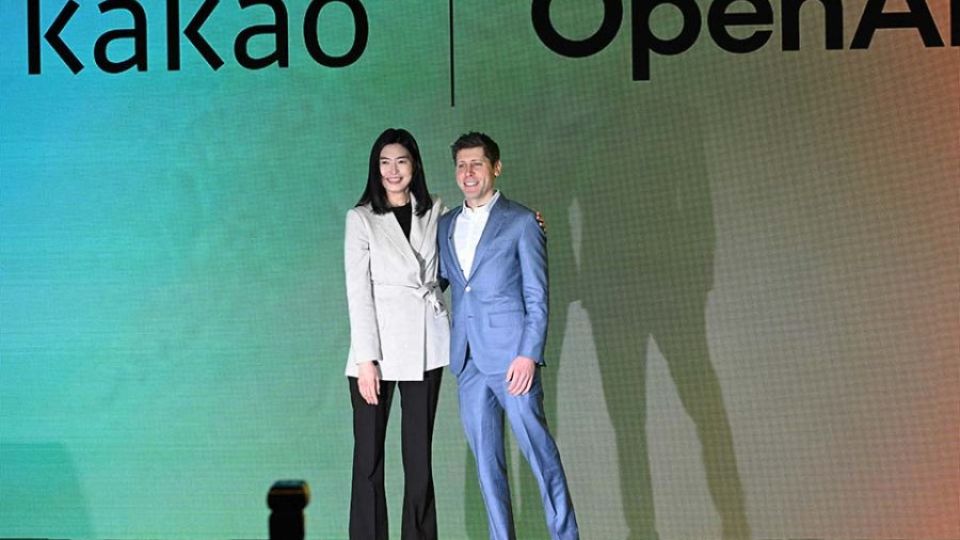February 7, 2025
SEOUL – OpenAI CEO Sam Altman and SoftBank Group CEO Masayoshi Son both visited Seoul on Tuesday and had a three-way meeting with Samsung Electronics Chairman Lee Jae-yong.
They reportedly discussed collaboration on AI investments and future strategies.
Their meeting is noteworthy, considering recent movements in the global AI industry.
The United States and China are vying for leadership in the industry. Companies of the US and its allies appear to seek collaboration against China’s own AI model. As the US-China competition intensifies, their cooperation is expected to speed up.
OpenAI and SoftBank are jointly proceeding with a $500 billion AI infrastructure project, Stargate. Cooperation of semiconductor manufacturers is essential here. It is likely that they sounded Samsung Electronics out to see if it would join the project.
The main reason why they held out their hands to Samsung, a company strong on the manufacture of semiconductors and mobile phones, appears to be that they felt it necessary to secure strong allies in competing against China, a startup of which shocked the world last week by launching DeepSeek, a low-cost AI model.
For Lee, whom the court cleared of all charges related to a merger between Samsung affiliates, cooperation with them could be of a great help to securing a momentum of future growth of his group.
The Donald Trump administration is putting much effort into the AI infrastructure project to defend the US hegemony as a country from which AI has originated. Trump announced the project next to Oracle co-founder Larry Ellison, SoftBank CEO Son and OpenAI CEO Altman at White House in Washington, last month. He showed he was at the head of efforts by the US and Japan to expand their AI alliance.
On Monday, Altman visited Tokyo, Japan, and agreed with Son to set up a joint venture in Japan to offer artificial intelligence services to corporate customers.
Chey Tae-won, chair of SK Group, which has SK Hynix, the country’s second-largest chipmaker, also met with Altman on Tuesday. Kakao, a Korean tech firm famous for KakaoTalk and its suite of Kakao apps, announced a strategic partnership with OpenAI.
With AI competition heating up after the launch of DeepSeek, the US appears to be moving fast to hold China in check through alliance, which is indispensable to expanding AI value chain through collaboration and division of labor.
If a trilateral AI alliance of Korea, the US and Japan were born, business opportunities for Korean companies will increase. It will also offer a chance for Korea to increase its chip exports and also upgrade its AI infrastructure and services.
However, Korea’s AI policies are only too unsatisfactory. The government launched a committee under the president in September last year to coordinate policies for the promotion of the domestic AI industry. It was pushing diverse plans including ones to attract investments from the private sector, offer tax benefits and operate funds. But it became inactive amid political turmoil after the martial law declaration and presidential impeachment.
As for artificial intelligence, ministries and agencies have acted individually. Layers of regulations and bureaucracy still stall new technology development
The government’s budget for the AI industry is dwarfed by that of the US and China. More worrisome is Korea’s small pool of AI talents. Students excelling in study tend to flock to medical colleges rather than to science and technology. So, there is no Korean company among global top 100 AI companies listed by the National Assembly Library, though Korea ranked sixth last year in light of Global AI Index compiled by Tortoise Media, a British news website.
OpenAI’s contacts with the Korean companies are encouraging. Artificial intelligence is central to future technologies such as autonomous driving and robotics. It is a promising industry and a source of job creation.
Fostering the growth of Korea’s tech sector around AI through collaboration with global tech firms is a national project that cannot be put off even for a second. An AI alliance with the US and Japan could be a path to developing Korea’s AI ecosystem.


